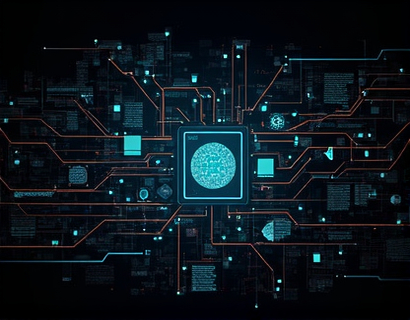Revolutionizing Digital Engagement: The Synergy of Crypto and AI in Intelligent App Ecosystems
The intersection of cryptocurrency and artificial intelligence (AI) is giving rise to a new era of digital engagement, where app ecosystems are being transformed to offer enhanced user experiences. This synergy is not just about combining two powerful technologies but about creating a holistic environment that leverages the strengths of both to drive innovation, security, and user-centric design. As we explore this transformative landscape, it becomes evident that the integration of crypto and AI is paving the way for more secure, efficient, and engaging digital interactions.
The Role of Cryptocurrency in App Ecosystems
Cryptocurrency, beyond being a digital currency, serves as a foundational element in app ecosystems by providing a decentralized and secure method for transactions. The use of blockchain technology, which underpins cryptocurrencies, ensures transparency, immutability, and security in transactions. This is particularly crucial in app ecosystems where user data and transactions are frequent and sensitive. By utilizing cryptocurrencies, apps can reduce reliance on traditional financial systems, which are often slow, expensive, and prone to fraud.
Moreover, cryptocurrencies enable microtransactions, allowing users to pay for small services or content without the need for intermediaries. This not only enhances user convenience but also opens up new revenue models for app developers. For instance, content creators can monetize their work directly through cryptocurrency, bypassing traditional gatekeepers and ensuring a fairer distribution of revenue.
AI-Driven Personalization in App Ecosystems
Artificial intelligence plays a pivotal role in enhancing user experiences within app ecosystems through advanced personalization techniques. AI algorithms analyze vast amounts of user data to understand preferences, behaviors, and patterns. This data-driven approach enables apps to tailor content, recommendations, and interactions to individual users, creating a more engaging and personalized experience. Personalization is no longer a luxury but a necessity in today's competitive digital landscape, where user retention hinges on the ability to deliver relevant and timely content.
AI-powered chatbots and virtual assistants further enhance user engagement by providing instant and context-aware support. These AI-driven interfaces can handle a wide range of tasks, from answering queries to facilitating transactions, all while learning and adapting to user interactions. This not only improves user satisfaction but also reduces the workload on human support teams, leading to cost savings and higher efficiency.
Enhancing Security with Crypto and AI
Security is a paramount concern in app ecosystems, and the combination of cryptocurrency and AI offers robust solutions to mitigate risks. Blockchain's inherent security features, such as cryptographic hashing and decentralized consensus mechanisms, make it difficult for malicious actors to alter or tamper with data. AI, on the other hand, can detect and respond to potential threats in real-time, enhancing the overall security posture of the app ecosystem.
Machine learning algorithms can analyze patterns in user behavior to identify anomalies that may indicate fraudulent activity. By integrating AI with blockchain, apps can create a multi-layered security framework that is both proactive and reactive. This synergy ensures that user data remains protected, fostering trust and encouraging greater adoption of digital services.
Smart Contracts: Automating Trust in App Transactions
Smart contracts, self-executing contracts with the terms directly written into code, are a game-changer in app ecosystems. They automate and enforce contractual obligations without the need for intermediaries, reducing costs and increasing efficiency. In the context of cryptocurrency, smart contracts ensure that transactions are executed only when predefined conditions are met, adding an extra layer of security and reliability.
For instance, in decentralized finance (DeFi) applications, smart contracts can automate lending, borrowing, and trading processes, making financial services more accessible and transparent. This automation not only streamlines operations but also reduces the risk of human error and fraud, making app ecosystems more robust and user-friendly.
Data Privacy and User Control
In an era where data privacy is a growing concern, the integration of cryptocurrency and AI in app ecosystems offers users greater control over their personal information. Blockchain technology allows users to own and manage their data, deciding who can access it and for what purpose. AI can enhance this by providing tools that help users understand and manage their data privacy settings more effectively.
Privacy-focused apps can leverage AI to anonymize and encrypt user data, ensuring that sensitive information remains confidential. This user-centric approach not only builds trust but also complies with stringent data protection regulations, such as the General Data Protection Regulation (GDPR). By prioritizing data privacy, app ecosystems can attract and retain users who value their digital rights.
Fostering Innovation through Decentralized Development
The decentralized nature of cryptocurrency and AI fosters an environment of innovation, where developers from around the world can collaborate on open-source projects. This collaborative model accelerates the development of new features and applications, driving the evolution of app ecosystems. Open-source platforms allow for continuous improvement and adaptation, ensuring that apps remain relevant and cutting-edge.
Moreover, the use of blockchain-based governance models enables community-driven decision-making, giving users a stake in the development process. This democratization of innovation ensures that apps evolve in line with user needs and preferences, creating a more inclusive and dynamic ecosystem.
Challenges and Considerations
While the integration of cryptocurrency and AI in app ecosystems offers numerous benefits, it also presents challenges that must be addressed. One of the primary concerns is the regulatory landscape, which is still evolving and varies significantly across different regions. App developers must navigate these complex regulations to ensure compliance and avoid legal pitfalls.
Another challenge is the technical complexity involved in integrating these technologies. Developers need to possess a deep understanding of both blockchain and AI to create seamless and efficient app ecosystems. This requires significant investment in research and development, as well as skilled personnel who can bridge the gap between these technologies.
Additionally, there is the issue of scalability. As the number of users and transactions grows, ensuring that the app ecosystem remains performant and cost-effective is crucial. Solutions such as layer 2 protocols and optimized AI algorithms are essential to address these scalability concerns and maintain a smooth user experience.
Future Prospects: The Next Frontier
The future of app ecosystems lies in the continued convergence of cryptocurrency and AI, opening up new frontiers in digital engagement. As these technologies mature, we can expect to see more sophisticated applications that blend the benefits of decentralization, security, and intelligence. The potential for augmented reality (AR) and virtual reality (VR) experiences powered by AI and supported by cryptocurrency transactions is immense, offering immersive and interactive user experiences.
Furthermore, the integration of Internet of Things (IoT) devices with blockchain and AI can lead to smarter, more autonomous systems that enhance various aspects of daily life, from smart homes to industrial automation. The synergy between these technologies will continue to drive innovation, creating a more connected, secure, and user-centric digital world.
In conclusion, the combination of cryptocurrency and AI is revolutionizing app ecosystems, offering enhanced security, personalization, and user control. As these technologies evolve, they will play a pivotal role in shaping the future of digital interactions, making apps more intuitive, efficient, and trustworthy. Embracing this transformative power is essential for anyone looking to stay ahead in the rapidly changing tech landscape.










































